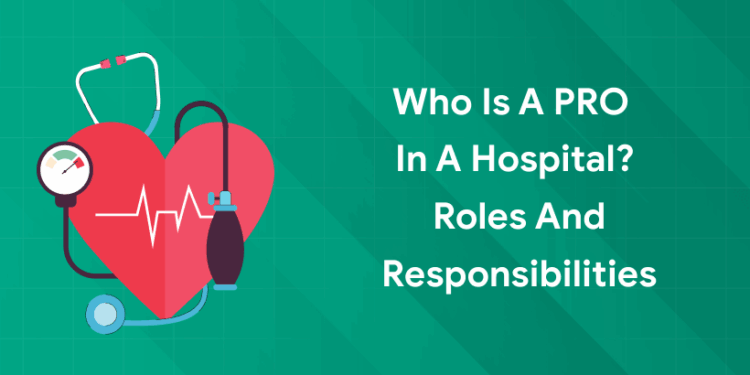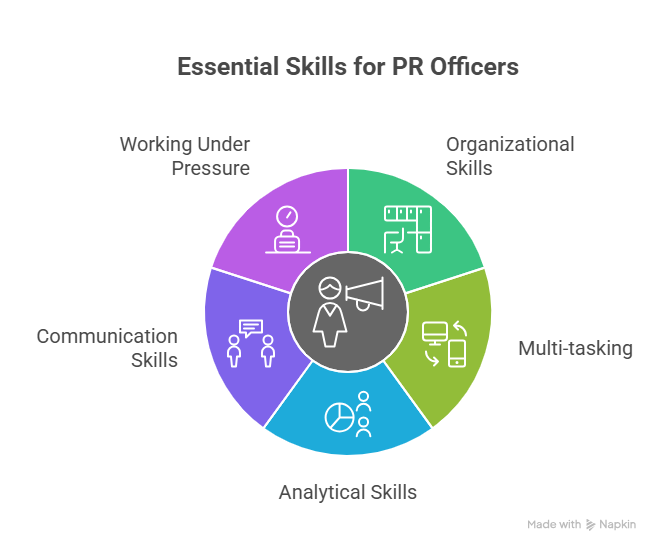Table of Contents
In healthcare settings, public relations personnel are in charge of preserving the ideal public perception of a medical facility. Because of this, they need to understand the facility’s internal operations as well as its strategic goals. Being effective in this kind of role also requires having strong interpersonal communication skills and solid people skills. Possessing outstanding persuasive writing abilities and a robust network of media contacts can also be advantageous.
What Does PRO Stand for in a Hospital?
PRO stands for Public Relations Officer in the area of hospital public relations.
Managing a hospital’s reputation, communications, and connections with the public, media, and occasionally internal stakeholders falls within the purview of a public relations officer. Among their primary responsibilities are:
- Handling media inquiries and press releases
- Highlighting hospital accomplishments and services
- Handling emergency crisis communication
- Planning events and campaigns related to public health
- Developing closer ties with stakeholders and the community
- Maintaining open lines of communication between the public and the hospital
Therefore, PRO refers to the Public Relations Officer in public relations, even if it can also indicate Patient-Reported Outcome in healthcare settings. The particular context of the hospital setting determines the meaning.
Key Roles of a Public Relations Officer (PRO) in a Hospital
1: What is the primary role of a hospital administrator?
1. Controlling Public Perception
- creates and preserves a favorable perception of the hospital in the eyes of the media and general public.
- guarantees unified messaging and branding across all platforms.
2. Relations with the Media
- serves as the primary liaison between the media and the hospital.
- creates statements and news releases and arranges hospital staff interviews.
3. Communication in Crisis Situations
- manages correspondence in times of emergency, like medical situations, legal disputes, or public health emergencies.
- prevents misinformation by making sure timely and accurate information is shared.
4. Communication between the Patient and Family
- provides information on hospital policies, procedures, and services to patients and their families.
- resolves grievances, issues, or criticism in order to raise patient satisfaction.
5. Internal Exchange of Information
- arranges for personnel and hospital management to communicate.
- encourages internal hospital updates and staff accomplishments.
6. Participation of the Comunity
- plans outreach initiatives, health camps, and awareness campaigns in an effort to foster community trust.
- improves the hospital’s connections with stakeholders and neighborhood organizations.
7. Management of Events
- organizes and oversees hospital events, such as donor programs, conferences, inaugurations, and health fairs.
- guarantees efficient media coverage and cooperation.
8. Marketing Campaigns and Services
- promotes the hospital’s newest divisions, therapies, or technological advancements.
- carries out public awareness campaigns about health issues or hospital projects.
In conclusion, the PRO is essential to the hospital’s ability to establish credibility, increase visibility, and sustain efficient communication.
Hospital Administration Course with Assured Career Growth
Hospital Administration Course by Entri App: Master essential healthcare management skills, gain certification, and secure top roles in leading hospitals
Join Now!Skills Required For Public Relations Officer
Certain personality traits, such as the ability to absorb information, creativity, dependability, and talent, are required to work as a public relations officer. In addition, the following list includes some more critical competencies for a public relations officer:
Organizational skills: These abilities enable you to make effective and efficient use of your resources. An organized individual typically effectively organizes their time, energy, and workplace to finish the tasks they are given. Depending on the specific job title and setting, organizational skills can take many various shapes. These include being able to communicate effectively with the team and fulfilling deadlines.
Multi-tasking: The capacity to carry out and finish several tasks at once is known as multitasking. In actuality, it has to do with planning. You can manage a lot of tasks with ease if you have the requisite practice, which makes work less stressful and easier.
Analytical Skills: These problem-solving abilities aid in the comprehension of facts and information in order to produce original, well-reasoned answers. An analytical individual concentrates on comprehending the data and facts at work and applies reason to solve problems.
Communication skills: The ability to exchange various forms of information, such fresh ideas or project updates, is known as communication skills. This ability include speaking, listening, observing, and empathizing as well. Understanding the distinctions between face-to-face and phone conversations as well as digital communication methods like social media and email is also beneficial.
Working under pressure and meeting deadlines: Working under pressure entails overcoming challenges that are frequently out of your control. This can involve last-minute adjustments, approaching due dates, and a lack of expertise required to finish assignments. Working under pressure also requires you to perform properly, and the quality of your work shouldn’t be impacted by stress.
Core Responsibilities of a Public Relations Officer (PRO) in a Hospital
1. Coordination of the Media
- Act as a point of contact for the media and the hospital.
- Create media kits, news releases, and press conferences.
- Answer questions from the media and highlight hospital accomplishments.
2. Management of Brands and Images
- Preserve and improve the hospital’s reputation and public image.
- Make sure that all public communications use the same message.
- Keep an eye on public opinion and respond to any unfavorable press.
3. Communication in Crisis Situations
- Handle communication during emergencies, accidents, or conflicts.
- Give the public and media timely, reliable information.
- Preserve the hospital’s image in times of emergency.
4. Internal Exchange of Information
- Inform hospital employees of critical notifications and updates.
- Use staff engagement programs and newsletters to cultivate a healthy organizational culture.
5. Relations with Patients and Visitors
- Help patients and their families with information, issues, or complaints.
- Ensure a good communication mechanism between patients and departments.
6. Public Engagement and Community Outreach
- Plan community service projects, health camps, and awareness campaigns.
- Establish and preserve connections with stakeholders and local groups.
7. Organizing and Managing Events
- Organize public campaigns, inaugurations, and seminars at the hospital.
- Oversee publicity and logistics to ensure a successful event.
8. Promotions and Marketing
- Use campaigns to advertise hospital departments, services, and experts.
- Work together with print and digital media to promote hospital programs.
A PRO is essential in maintaining openness, trust, and a favorable institutional image by serving as a liaison between the public and the hospital.
| Also Read | |
| How to Become a Hospital Administrator | |
| Career Pathways in Hospital and Healthcare Administration |
Career Scope and Opportunities for Hospital PROs
By establishing a connection between the public and the hospital, hospital public relations officers, or PROs, are essential to healthcare communication. They are responsible for managing the hospital’s image, creating connections with stakeholders, and communicating information effectively. Hospital PROs might pursue careers as marketing and communications specialists, public relations managers, and communications officers. There is room for advancement in hospital administration as well as associated fields like patient relations and healthcare marketing.
- Manager of Public Relations:
Oversees media relations, community involvement, and crisis communication as part of the hospital’s broader public relations and communication strategy.
- Officer of Communications:
Focuses on internal and external communication, designing messages, managing social media, and developing communication products.
- Expert in Communications and Marketing:
Combines public relations and marketing expertise to advertise the hospital’s activities, services, and brand.
- Coordinator of Patient Relations:
Addresses issues, handles comments, and improves the patient experience by working closely with patients and their families.
- Coordinator of Community Outreach:
Creates and carries out initiatives to interact with the neighborhood and form alliances.
- Medical Tourism Coordinator:
The PRO may assist in organizing the care and communication of foreign patients if the hospital receives them.
Growth Opportunities:
- Advancement to senior PR roles:
PROs can advance to senior roles in the hospital’s marketing or communication division with experience and skill.
- Expertise in particular fields:
The areas that PROs choose to concentrate on include patient connections, digital communication, and media relations.
- Skills that can be applied to various areas of healthcare:
Other healthcare environments, such health insurance organizations, pharmaceutical corporations, or healthcare consulting firms, can benefit from the skills a hospital PRO has learned.
- Additional education:
Higher-level leadership and administrative roles within the hospital may become available to those with an MBA in Healthcare Management.
Hospital Administration Course with Assured Career Growth
Hospital Administration Course by Entri App: Master essential healthcare management skills, gain certification, and secure top roles in leading hospitals
Join Now!Conclusion
In the healthcare industry, public relations is crucial to advancing any company’s goals. The healthcare sector is crowded with competitors, making it difficult to stand out from the crowd. Public relations assists businesses in becoming easily identifiable in the marketplace. PR is the division of a company that is in charge of building, preserving, and managing the company’s reputation in the event that a negative circumstance occurs.
When speaking with employees, the public, investors, and numerous other stakeholders, public relations handles communication both inside and beyond the organization. The post has covered a lot of ground, including what public relations is, how it’s used in the healthcare sector, why it’s so important, and how healthcare marketing firms may assist you with public relations.
Hospital Administration Course with Assured Career Growth
Hospital Administration Course by Entri App: Master essential healthcare management skills, gain certification, and secure top roles in leading hospitals
Join Now!












